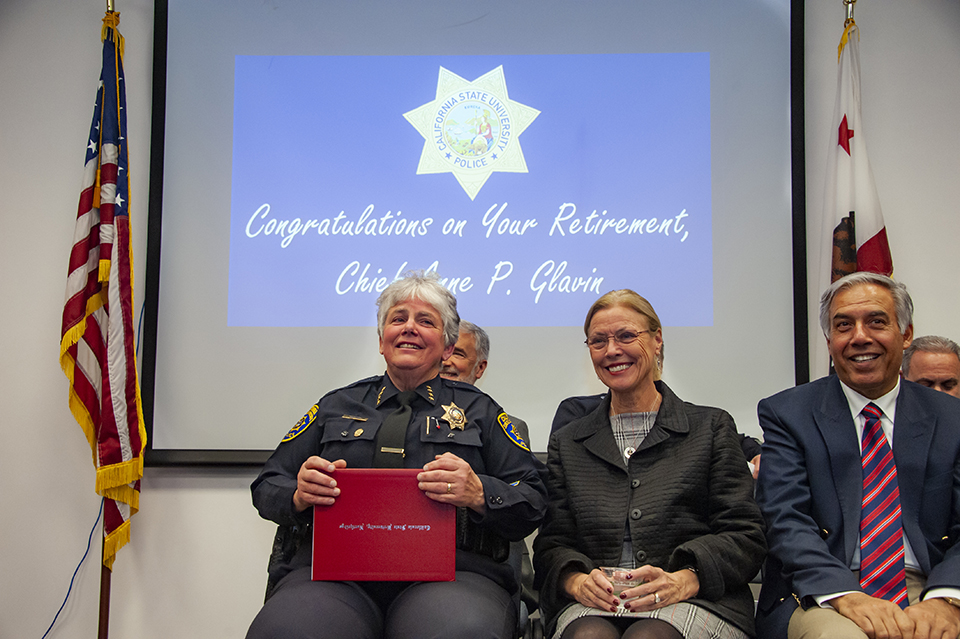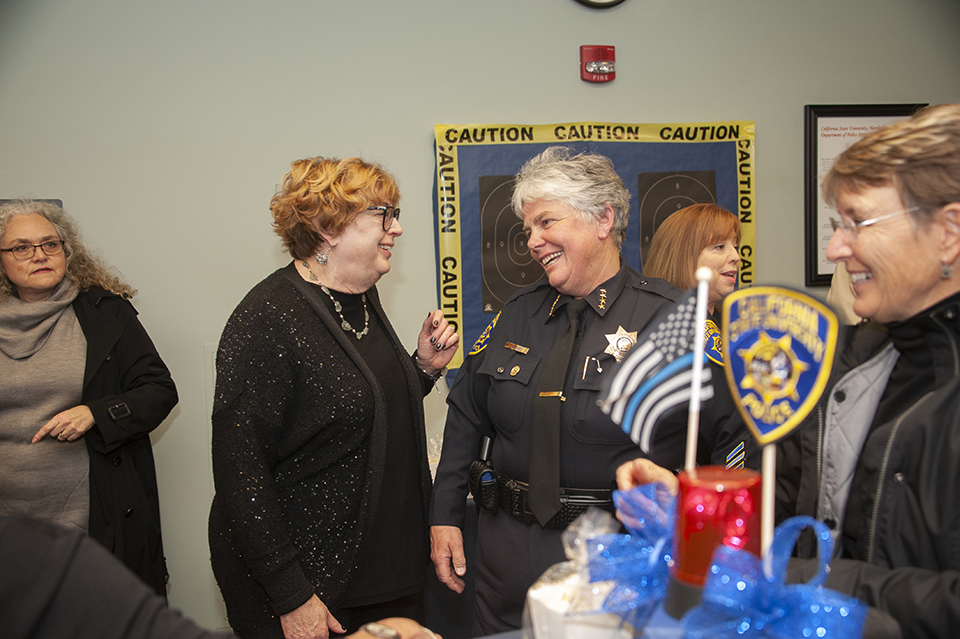Retiring CSUN Police Chief Blazed Trails for Women in Law Enforcement
Police uniforms weren’t designed for women when Anne Glavin joined the force at the Massachusetts Institute of Technology (MIT) in the mid-1970s.
When she chose her career, there were only 20 women in law enforcement in the state of Massachusetts, and they had to fight multiple forms of discrimination, including a 6-foot height requirement to join the force.
The department issued Glavin a short-sleeve, men’s shirt. Her badge read “patrolman.” Somehow, the female-specific items were even worse: a navy skirt, a straw hat designed for women but much different than the men’s, and a criss-cross tie.
Wearing that, Glavin said, she felt ridiculous.
She ditched the skirt and bought some uniform pants — also men’s. She got a new hat and tie, both like the men’s. She asked for a more gender-appropriate badge (maybe she could get one that said “patrol officer”?) and settled for one with “man” blotted out with silver paint.
This was the uniform and a few of the tools she needed, but her work transforming the face of university-based law enforcement was just beginning.
Glavin is retiring this month after 43 years as a peace officer, including more than 16 as chief of the California State University, Northridge Department of Police Services. As the first woman to serve as a police chief at a major university when MIT promoted her to that position in 1987, she helped pave the way for women in law enforcement. Her work also removed barriers for women to serve, as she helped study discriminatory practices in agility testing and height requirements for the job of police officer in Massachusetts — requirements that were later eliminated.
She felt she had nothing left to accomplish at MIT when she learned of a new challenge and opportunity at CSUN in 2002, Glavin said. Her ground-breaking work continued on the West Coast. Under her watch, CSUN’s force became a nationally accredited, collaborative unit that engaged with the community to defend against uniquely 21st-century threats.
“Chief Glavin will be missed,” said CSUN President Dianne F. Harrison. “In every situation, she brought professionalism and a sense of calm that I always appreciated. Her commitment to community policing and safety, emergency preparedness, crime prevention, law enforcement accreditation, training, and sexual violence prevention have made her a model for her peers in the CSU and nationwide, and she did so while breaking down barriers for women in law enforcement. CSUN is grateful for her service to the campus and broader community, and we wish her the very best in retirement.”
In honor of her distinguished service at CSUN and her 43 years in university law enforcement, Harrison bestowed Emeritus status upon Glavin.
Glavin is most proud of her work to achieve department accreditation by the International Association of Campus Law Enforcement Administrators (IACLEA) in 2008, certifying that CSUN’s department follows the best professional practices and standards in the field consistent with the unique needs of the campus community. CSUN is still one of just four universities in the 23-campus California State University system to be accredited.
Not only has the university been re-accredited three times, but Glavin served as president of IACLEA and CSUN Capt. Scott VanScoy serves as a national assessor for the organization, verifying the compliance of other departments across the country.
From the beginning of her time at CSUN, Glavin implemented programs to make officers more visible and more familiar to students and community members. Officers patrolled mainly in cars in 2002, so Glavin quickly worked to establish patrol efforts including foot, bicycle and motorcycle patrols.
As a deterrent to crime in the student housing area on the north side of campus, Glavin established a two-person community policing team that spent all its time in Student Housing. Officers received budgets to host ice cream and pizza socials, to better get to know CSUN students, and they were encouraged to join in on pickup basketball games around the dorms.
Such activities changed the perception of officers on campus, Glavin said.
“They’re not just cops in blue uniforms — they’re people,” she said.
Glavin also established a K-9 unit featuring dogs that can detect explosive devices. Two dogs and their human partners are used for security at highly attended events such as commencement, and they are also rented to other organizations for security at important events.
“The dogs are more beloved than any of the human beings on our force,” Glavin said. “People want their pictures taken with them.”
CSUN is one of the most diverse universities in the nation, and Glavin’s department took care to serve its constituents fairly, including cultural sensitivity training with the Anti-Defamation League. The training and other department policies help nurture an environment to help victims of hate crimes feel comfortable in reporting them to police.
Glavin’s department also implemented a full-time public education program, including crime prevention education offered to students, faculty, staff and the community.
“It truly is a partnership,” Glavin said. “We can’t do it all. We need the community’s help. We get a lot of support, and I’m grateful for that. I hope that happens for the next chief as well.”
Glavin plans to return to New England for her retirement.



 experience
experience